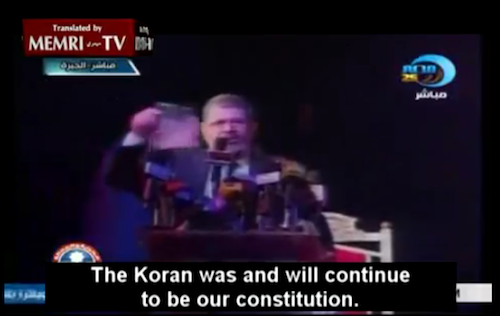The Egyptian Intellectual Constitution
by Hamdy El-Gazzar / August 27, 2012 / No comments
In the wake of the revolution, a group of intellectuals fights to preserve freedom

Egyptian President Morsi on May 13, 2012. Photo: Youtube user MEMRITVVideos.
In the aftermath of the revolution, more specifically February 2011 and the argument over whether the new constitution should come before the presidential elections, a movement was formed under the name “The cultural constitution.” The founding members, theater director Ahmed Ismail, poet and translator Rifaat Salam, and artist and critic Ezz el din Naguib, met to discuss the composition of a document that would express the cultural demands of the revolution and preserve the integrity of cultural and creative ideas in the coming years. After several discussions and workshops, many Egyptian artists and intellectuals joined to foster what this group refers to as “the cultural constitution.” This document focuses on four main issues: Identity, freedom, the role of intellect, and the establishment of cultural foundations.

- “From Egypt” attempts to draw a cultural map of Egypt and the Arab world by profiling the artistic, literary, and political issues that affect the region via on-the-ground coverage of current events, publications, and the fight for freedom of expression.

- Hamdy El-Gazzar is an Egyptian writer and one of the 39 young Arab writers included in the Beirut 39 Project. His first novel, Sihr Aswad (Dar Merit, 2005) won the prestigious Sawaris Award, and was subsequently translated by Humphrey Davies (Black Magic, AUC Press, 2007). His second novel, Ladhdhat Sirriyya (Secret Pleasures) was published by Dar al-Dar in 2008. He is currently working on a third novel.
What they found is that the Egyptian identity is a complex 3D structure which undergoes constant change and is formed by a multitude of traditions and cultures: ancient Egypt, Coptic Egypt, Arabic Egypt, and Islamic Egypt as well as being affected by worldwide changes in culture and tradition.
It is evident now that this definition of the Egyptian identity clashes with the Islamic identity that the Islamic political party is trying to force on Egypt. However, “Freedom” in the cultural constitution is the key point and the reason the document exists. Freedom is also the basis of social progress and development. Therefore it is crucial that the minds of the people are freed.
In addition, it is clear now that the rising Islamic party in Egypt is against artistic creativity in every way and perhaps scientific creativity as well. The party is trying to impose their “religious” ideology into every aspect of life including creativity and cultural affairs.
The document, however, shows that cultural awareness is the living consciousness of the people, and its role is irreplaceable within a society. Therefore, the enlightened intellect who thinks critical thoughts is responsible for increasing the level of public awareness and exposing all conspiracies. It is important then, to secure this intellect’s independence and freedom.
The reality is that the Islamic Political Ideology has become louder than the voices of all Egypt’s intellectuals. The religious, salafi leaders, to be more precise, have converted their mosques into schools that preach hatred towards the arts, cultural expression, and independent thought. The movement seeks to spread this hostility into society, which is seen only as an enemy of their “Islamic” populations. The intellectual has been pushed out of the scene when it was he who launched the revolution and actively participated in it, the same way democratic parties and leftists have been swept off the political stage.
The cultural constitution insures that cultural awareness is a given right for all citizens, and it is important to foster the notions of independent intellect and to liberate Egypt’s Ministry of Cultural Affairs from all bureaucracy and corruption and see that it rises within its role to support free creativity as a foundation that is independent from the political and ideological agendas of the the government.
Today, after the government has been reformed, with a Brotherhood identity of course, and in the midst of its attack on public media outlets and the change in role of national newspapers and magazines, shutting down cable channels, confiscating newspapers and banning articles by journalists Ibrahim Abdel Meguid, Youssef al-Qaeed, and Abla el Reweni, it has become clear that culture and the arts are facing a battle of life or death. Egypt’s intellectuals feel that the Ministry of Cultural Affairs will soon fall into the hands of the Islamic political movement which dreams of transforming every aspect of Egypt to match its own private vision.
Now more than ever, intellectuals must hang onto their belief in the Cultural Constitution and fight the battle to instill it into the national constitution and stand up against the darkening of minds.
The full text of “The Cultural Constitution” can be found here.
To learn a little bit more visit the group’s Facebook page.
Translation: Nour Abdelghani




